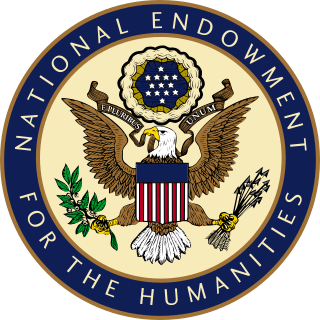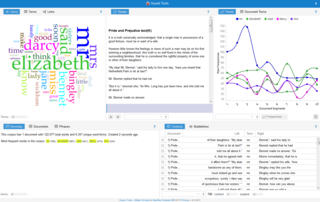The Fulbright Program, including the Fulbright–Hays Program, is one of several United States Cultural Exchange Programs with the goal of improving intercultural relations, cultural diplomacy, and intercultural competence between the people of the United States and other countries through the exchange of persons, knowledge, and skills. Via the program, competitively-selected American citizens including students, scholars, teachers, professionals, scientists, and artists may receive scholarships or grants to study, conduct research, teach, or exercise their talents abroad; and citizens of other countries may qualify to do the same in the United States.
The Graduate School and University Center of the City University of New York is a public research institution and postgraduate university in New York City. Formed in 1961 as Division of Graduate Studies at City University of New York, it was renamed to Graduate School and University Center in 1969. Serving as the principal doctorate-granting institution of the City University of New York (CUNY) system, CUNY Graduate Center is classified among "R1: Doctoral Universities – Very High Research Activity".

The National Endowment for the Humanities (NEH) is an independent federal agency of the U.S. government, established by the National Foundation on the Arts and the Humanities Act of 1965, dedicated to supporting research, education, preservation, and public programs in the humanities. The NEH is housed in the Constitution Center at 400 7th St SW, Washington, D.C. From 1979 to 2014, NEH was at 1100 Pennsylvania Avenue, N.W., Washington, D.C., in the Nancy Hanks Center at the Old Post Office.

Cheikh Anta Diop University, also known as the Cheikh Anta Diop University of Dakar, is a university in Dakar, Senegal. It is named after the Senegalese physicist, historian and anthropologist Cheikh Anta Diop and has an enrollment of over 60,000.
The American Council of Learned Societies (ACLS) is a private, nonprofit federation of 75 scholarly organizations in the humanities and related social sciences founded in 1919. It is best known for its fellowship competitions which provide a range of opportunities for scholars in the humanities and related social sciences at all career stages, from graduate students to distinguished professors to independent scholars, working with a number of disciplines and methodologies in the U.S. and abroad.

Digital humanities (DH) is an area of scholarly activity at the intersection of computing or digital technologies and the disciplines of the humanities. It includes the systematic use of digital resources in the humanities, as well as the analysis of their application. DH can be defined as new ways of doing scholarship that involve collaborative, transdisciplinary, and computationally engaged research, teaching, and publishing. It brings digital tools and methods to the study of the humanities with the recognition that the printed word is no longer the main medium for knowledge production and distribution.

The European University Institute (EUI) is an international postgraduate and post-doctoral research-intensive university and an intergovernmental organisation with juridical personality, established by its founding member states to contribute to cultural and scientific development in the social sciences, in a European perspective. Its main campus is located in the hills above Florence in Fiesole, Italy.
The American Institute of Iranian Studies (AIIrS) is a non-profit consortium of US universities and museums, founded in 1967, for the purpose of promoting Iranian and Persian studies. AIIrS facilitates academic and cultural exchange between the US and Iran and is dedicated to supporting scholars and funding research in Iranian Studies. It represents American institutions of higher education and research in Iranian Studies and furthers the field in the US curriculum.

The American Center for Mongolian Studies (ACMS) is a US registered 501(c)3 not-for-profit, academic organization which promotes research and scholarship in Inner Asia, a broad region consisting of Mongolia and parts of China, Russia and Central Asia, including Inner Mongolia, Xinjiang, Buryatia, Tuva and eastern Kazakhstan.
The West African Research Center is the overseas research center for the United States-based West African Research Association (WARA). It is located in Dakar, Senegal. WARC is a center for academic exchange between American and West African scholars that encourages research on the region of West Africa. The idea for the overseas center came about in May 1992 and was implemented in the fall of 1993. Since its inception, WARC has grown both in terms of staff and influence as it continues to connect researchers in the USA with researchers in the region of West Africa interested in common issues. Currently, WARC is headed by Dr. Ousmane Sene. It is located in the Fann-Point E-Amitié neighborhood of Dakar.
IFAN is a cultural and scientific institute in the nations of the former French West Africa. Founded in Dakar, Senegal in 1938 as the Institut français d’Afrique noire, the name was changed only in 1966. It was headquartered in what is now the building of the IFAN Museum of African Arts. Since its founding, its charge was to study the language, history, and culture of the peoples ruled by French colonialism in Africa.

The School for Advanced Research (SAR), until 2007 known as the School of American Research and founded in 1907 as the School for American Archaeology (SAA), is an advanced research center located in Santa Fe, New Mexico, U.S. Since 1967, the scope of the school's activities has embraced a global perspective through programs to encourage advanced scholarship in anthropology and related social science disciplines and the humanities, and to facilitate the work of Native American scholars and artists. SAR offers residential fellowships for artists and scholars, and it publishes academic and popular non-fiction books through SAR Press.

(Tseng) Hao Huang (黄俊豪) is a Hakka Chinese American concert pianist, published scholar, narrator, playwright, composer and the Bessie and Cecil Frankel Endowed Chair in Music at Scripps College.
The Chiang Ching-kuo Foundation for International Scholarly Exchange is a private nonprofit organization located in Taipei, Taiwan, that provides support for research grants on Chinese studies in the humanities and social sciences at overseas institutions. It was founded in 1989 and named after Chiang Ching-kuo, the late President of the Republic of China from 1972 to 1988. The foundation also has a regional office in McLean, Virginia in the United States.
The Medici Archive Project (MAP) is a research institute whose mission is to disseminate, publish, and teach archival studies, paleography and the cultural legacy of the Medici Grand Dukes. It is based in Florence, Italy and is directed by Alessio Assonitis.
The Walter Chapin Simpson Center for the Humanities, located in Seattle, Washington, is one of the largest and most comprehensive humanities centers in the United States. Housed in the College of Arts and Sciences at the University of Washington (UW), it offers UW scholars a spectrum of local opportunities for intellectual community and grant support that advances crossdisciplinarity, collaboration, and research while networking them nationally and internationally.

The American Institute of Indian Studies (AIIS), founded in 1961, is a consortium of 90 universities and colleges in the United States that promotes the advancement of knowledge about India in the U.S. It carries out this purpose by: awarding fellowships to scholars and artists to carry out their research and artistic projects in India; by operating intensive programs in a variety of Indian languages in India; by sponsoring conferences, workshops and outreach activities; by supporting U.S. study abroad and service learning programs in India; by assisting and facilitating the research of all U.S. scholars in India; and by operating two research archives, the Archives and Research Center for Ethnomusicology and the Center for Art and Archaeology. The AIIS is a member of the Council of American Overseas Research Centers.
Social Networks and Archival Context (SNAC) is an online project for discovering, locating, and using distributed historical records in regard to individual people, families, and organizations.
Senam Okudzeto is an American and British artist and educator who lives and works in Basel, London, Ghana and New York City.
Aminata Diaw Cissé was a Senegalese lecturer and political philosopher who taught at the Cheikh Anta Diop University (UCAD). Influenced by Jean-Jacques Rousseau and her academia background, she wrote about citizenship, civil society, democracy, development, ethnicity, gender, globalisation, human rights, identity, nationality and the state in an African and Senegalese context by using a political insight. Diaw worked for the Council for the Development of Social Science Research in Africa (CODESRIA), Bellagio Study and Conference Center of the Rockfeller Foundation, National UNESCO Sub-Commission on Social Sciences and Humanities, West African Research Association, the National UNESCO Sub-Commission on Social Sciences and Humanities and the Philosophical and Epistemological Research Center of the Doctoral School Studies.








